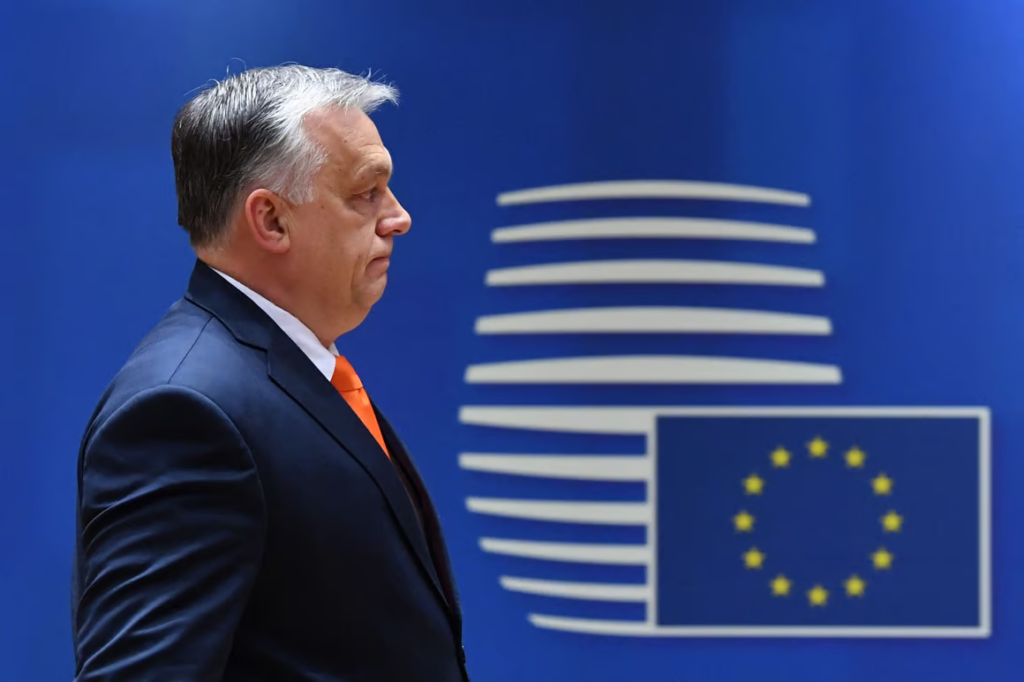
- As the EU faces decisions regarding funding for Hungary over rule-of-law concerns, Orban’s actions regarding Ukraine are seen by some as a means of exerting pressure.
- Orban’s emphasis on conservative values, national sovereignty, and a departure from the pro-globalization agenda is a marked departure from the cooperative relationship Hungary enjoyed with the EU during socialist governance.
- Hungary’s close ties to Russia that serve Hungary’s interests, especially in energy supplies, appear to take precedence over a positive relationship with Ukraine.
Hungary, a member of the European Union (EU) since 2004, is currently navigating a complex relationship with the union, raising questions about the future of this longstanding partnership. The intricacies span economic interdependence, political shifts, rule-of-law disputes, financial consequences, public opinion, and an uncertain future.
Historically, Hungary’s economic ties with the EU have been robust, with a significant portion of its exports and imports deeply entwined with EU member states. Approximately 78 per cent of Hungary’s exports find their destination in EU countries, particularly Germany. However, recent economic challenges arose in 2022 when budget funds were withdrawn by Brussels over concerns related to the rule of law. This withdrawal marked a departure from the country’s prior status as a net recipient of EU structural assistance.
The political landscape shifted notably in 2010 when Viktor Orban’s Fidesz party secured a two-thirds majority. Orban’s emphasis on conservative values, national sovereignty, and a departure from the pro-globalization agenda set the stage for a more independent Hungarian stance. This marked a significant departure from the cooperative relationship Hungary enjoyed with the EU during socialist governance.
Tensions escalated as the EU raised concerns about Hungary’s commitment to the rule of law. Disputes over issues like migrant resettlement, NGO funding disclosure, and treatment of asylum seekers led to legal battles, with the European Court of Justice playing a pivotal role. These disputes not only strained relations but also became symbolic of deeper ideological differences between Hungary and the EU.
The adoption of the “conditionality mechanism” by the EU in 2020 linked fund disbursement to adherence to the rule of law. This decision led to a freeze in funds for Hungary, sparking economic challenges. Hungary contends that the EU is using financial tools to impose its values, while Brussels sees this as a means to induce systemic change within the country.
Historically, a majority of Hungarians supported EU membership. However, recent Western sanctions against Russia and the cancellation of EU funds have led to a decline in public approval. Orban, despite facing criticism, maintains Hungary’s commitment to the EU. Yet, concerns persist that prolonged fund cancellations could jeopardize Hungary’s voting rights, possibly prompting consideration of leaving the union.
PM Orban’s relations with Ukraine
Orban’s stance on Russia’s aggression initially raised eyebrows, with a reluctance to swiftly condemn the invasion. He referred to it as a “Russian–Ukrainian war” and consistently emphasized that it was not Hungary’s conflict. Furthermore, Orban’s symbolic actions, such as wearing a scarf depicting Hungary’s pre-World War I territory during a soccer match, added fuel to the diplomatic tension.
The strategic use of Hungary’s veto power within the EU has been notable. While Hungary generally supported EU sanctions against Russia, it vetoed measures against Patriarch Kirill, head of the Russian Orthodox Church. Orban secured exemptions for Hungary, criticized existing sanctions, and rejected arms deliveries to Ukraine, citing a refusal to allow the transit of weapons through Hungarian territory.
Orban’s evolving stance on Ukraine is significant. Once a supporter of a democratic Ukraine with Euro-Atlantic ambitions, his priorities shifted after becoming prime minister in 2010. Disputes intensified over the Hungarian minority in Ukraine, particularly in Transcarpathia, leading to disagreements on language laws and accusations of separatism.
The issue of dual citizenship further strained relations, with Hungary vetoing NATO cooperation with Ukraine multiple times. The granting of Hungarian citizenship to Ukrainian citizens at the Hungarian consulate in Berehove sparked a diplomatic rift. Orban’s calls for autonomy and dual citizenship for the Hungarian minority fueled accusations of separatism.
While Ukraine has been entangled in Orban’s domestic and foreign policies, the motivations behind his actions may also be linked to broader geopolitical considerations. Hungary’s close ties to Russia, especially in energy supplies, appear to take precedence over fostering a positive relationship with Ukraine. Orban’s statements, blaming the West for Russia’s war on Ukraine, suggest an alignment that serves Hungary’s interests.
As the EU faces decisions regarding funding for Hungary over rule-of-law concerns, Orban’s actions regarding Ukraine are seen by some as a means of exerting pressure. Whether Ukraine is caught in the crossfire of domestic politics or used as a bargaining chip in EU negotiations, the situation underscores the complexity of Hungary’s relationship with both its neighbours and the European Union.
Reference:
Aayush Pal is a freelance writer on contemporary geopolitical developments. The views expressed in his work are entirely his own.
